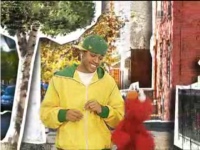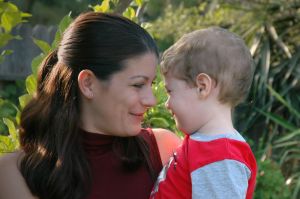My Kid is Better Than Your Kid!
I am
 writing this with humility, because I am guilty of this topic. I think most moms have been caught up in a competitive parenting mindset at one point or another, though. These competitive parenting conversations range from everything from basic child-rearing practices, who delivered the biggest baby, who’s child accomplished major milestones the earliest (walking, potty-training, getting their first tooth, etc.) to who breastfed their child the longest. The funniest thing about our competitiveness as moms is that it isn’t limited to having the most advanced child. Sometimes, the competition is about who’s child gets up at night the most, who’s child had colic the longest, who’s child was the latest walker, who’s child is the pickiest eater, who’s child wasn’t potty trained until they were five, who’s husband helps the least, etc. I am embarrassed to admit that I have actually tried to one-up other moms about Connor’s horrific colic which forced me to hold him all night, every night, on the couch and to wear him all day in the Baby Bjorn. Why???
writing this with humility, because I am guilty of this topic. I think most moms have been caught up in a competitive parenting mindset at one point or another, though. These competitive parenting conversations range from everything from basic child-rearing practices, who delivered the biggest baby, who’s child accomplished major milestones the earliest (walking, potty-training, getting their first tooth, etc.) to who breastfed their child the longest. The funniest thing about our competitiveness as moms is that it isn’t limited to having the most advanced child. Sometimes, the competition is about who’s child gets up at night the most, who’s child had colic the longest, who’s child was the latest walker, who’s child is the pickiest eater, who’s child wasn’t potty trained until they were five, who’s husband helps the least, etc. I am embarrassed to admit that I have actually tried to one-up other moms about Connor’s horrific colic which forced me to hold him all night, every night, on the couch and to wear him all day in the Baby Bjorn. Why???
This isn’t limited to the “typical developing” world! Trumping and one-upping is very prevalent in the world of raising children with delays. When I’m around other parents of children with Down syndrome, I feel like I can let my competitive nature go wild because there is a “fair playing field” (not true) when comparing Darah to children who also have Down syndrome. Just like moms of typical developing children, these competitive conversations are sometimes about who’s child is the most advanced and sometimes about who’s child is struggling the most or has the most health issues.This competitive attitude comes out with our closest friends and with complete strangers. I believe that most parents are competitive because we all want validation in our parenting and sometimes we want the other mom to know we’re doing an ok job in parenting. When we has it harder than the other mom, we feel better that we’ve gained sympathy from the other mom or feel validated for being grumpy with our husband!
The Today Show has this article which gives five tips for dealing with other moms who are competing unsolicited. They suggest trying to understand where your friend is coming from and if she is feeling insecure about something, not allowing your friend to determine what your goals or success is, respond in noncompetitive ways and being reaffirming to your friend, refusing the urge to one-up your friend and just letting the conversation be about her, or letting your friend know how you feel.
If your struggling with competing with other moms, I suggest that you slow down and keep a proper perspective. Kids who are not living an overly structured life and have time to explore and have free play are “more creative, more self-sufficient, and less stressed than other children.” If your child potty trains at 13 months old or at 3 years and 11 months old, I am going to guess that there will be absolutely zero long-term effects. Earlier walkers do not climb the corporate ladder faster than late walkers. I have joked that my epidurals during my deliveries does not mean my Mother’s Day card is smaller!
It’s wonderful to be proud of your child and perfectly natural to engage in some minor bragging, but it’s important to try not to cross the “I can trump that” line.
How has competitive parenting affected you?
Share the fun: Email + Del.icio.us + Digg + Technorati







